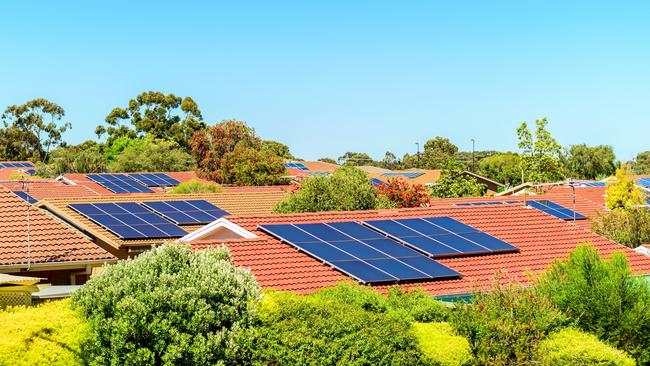Questions raised over solar panel pay-off
Victoria’s solar customers could soon face cuts to the amount retailers pay them for supplying excess power to grid. So is it really worth getting solar panels?
Solar customers in Victoria are saving up to $1095 a year on average power bills compared with other households, research has calculated.
But many could face cuts to the amount retailers pay them for exporting excess energy to the grid.
Minimum electricity feed-in tariff rates, which are set by the Essential Services Commission annually, will drop from July.
The single-rate minimum feed-in tariff will fall from 12c per kilowatt hour of electricity exported to 10.2c.
The time-varying minimum feed-in tariff will be between 9.1c and 12.5c/kWh, depending on the time of day and day of the week. That’s down from between 9.9c to 14.6c/kWh.
The ESC updates the rates each year to reflect wholesale electricity market price changes. Retailers can offer rates above the regulated minimum rates.
The decision comes as Vinnies energy analyst Gavin Dufty warned of a growing divide between energy “haves and have nots”.
“Households with solar are a lot better off,” Mr Dufty said.
“What concerns us are the significant amount of subsidies going to these households that others can’t get if they are renting or can’t afford the upfront costs to install.
“These subsidies include the taxpayer-funded solar homes rebate, and 2.5c included in feed-in tariffs for reducing carbon emissions.”
The St Vincent de Paul Society has calculated annual electricity bills for new solar customers in Melbourne are $860-$940 lower than non-solar households with the same energy use.
For regional homes, the savings are even bigger at $995-$1095, as there is less overshadowing of solar panels.
The estimates are based on typical consumption on a standalone market offer, having a 3kW solar system, and feed-in tariff bill credits.

The ESC ruling notes: “As we set the minimum FiT rates annually, we expect to see the rates fluctuate, particularly as wholesale electricity prices change in the energy futures market.
“Furthermore, it is not open to the commission to set the minimum FiT rates on the basis of other considerations, such as allowing solar customers to recover their investments or to promote uptake of rooftop solar generation.”
Major retailers EnergyAustralia, Origin Energy and AGL yesterday confirmed their feed-in rates would be reviewed.
The Vinnies’ Victoria Energy Prices report urges solar customers to not choose plans based on feed-in tariff rates alone. Some plans offering higher FiT rates had uncompetitive prices for when electricity was consumed from the grid, leading to higher bills.
MORE NEWS
BANKS DROP RATES AS THEY HIT RECORD LOW
